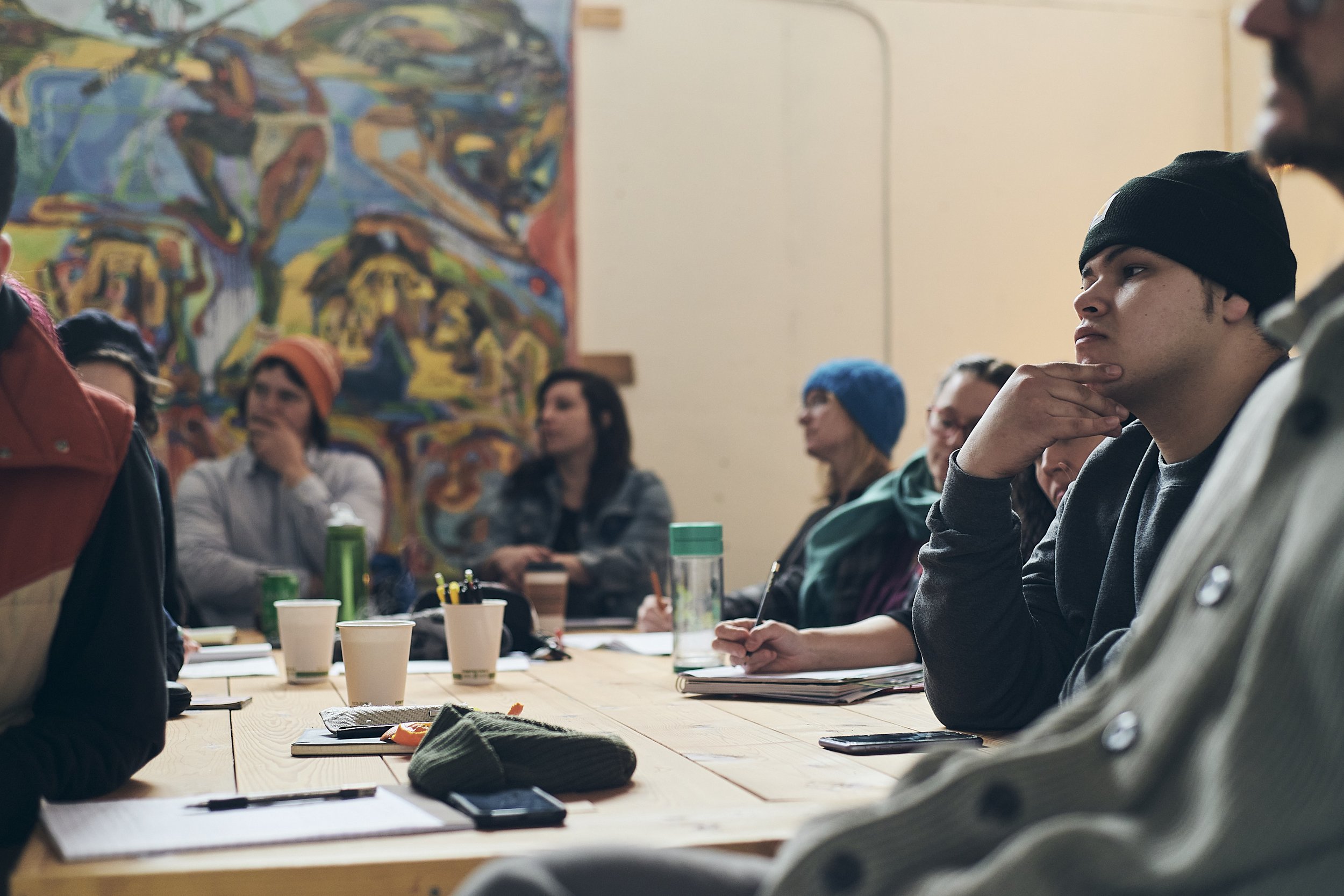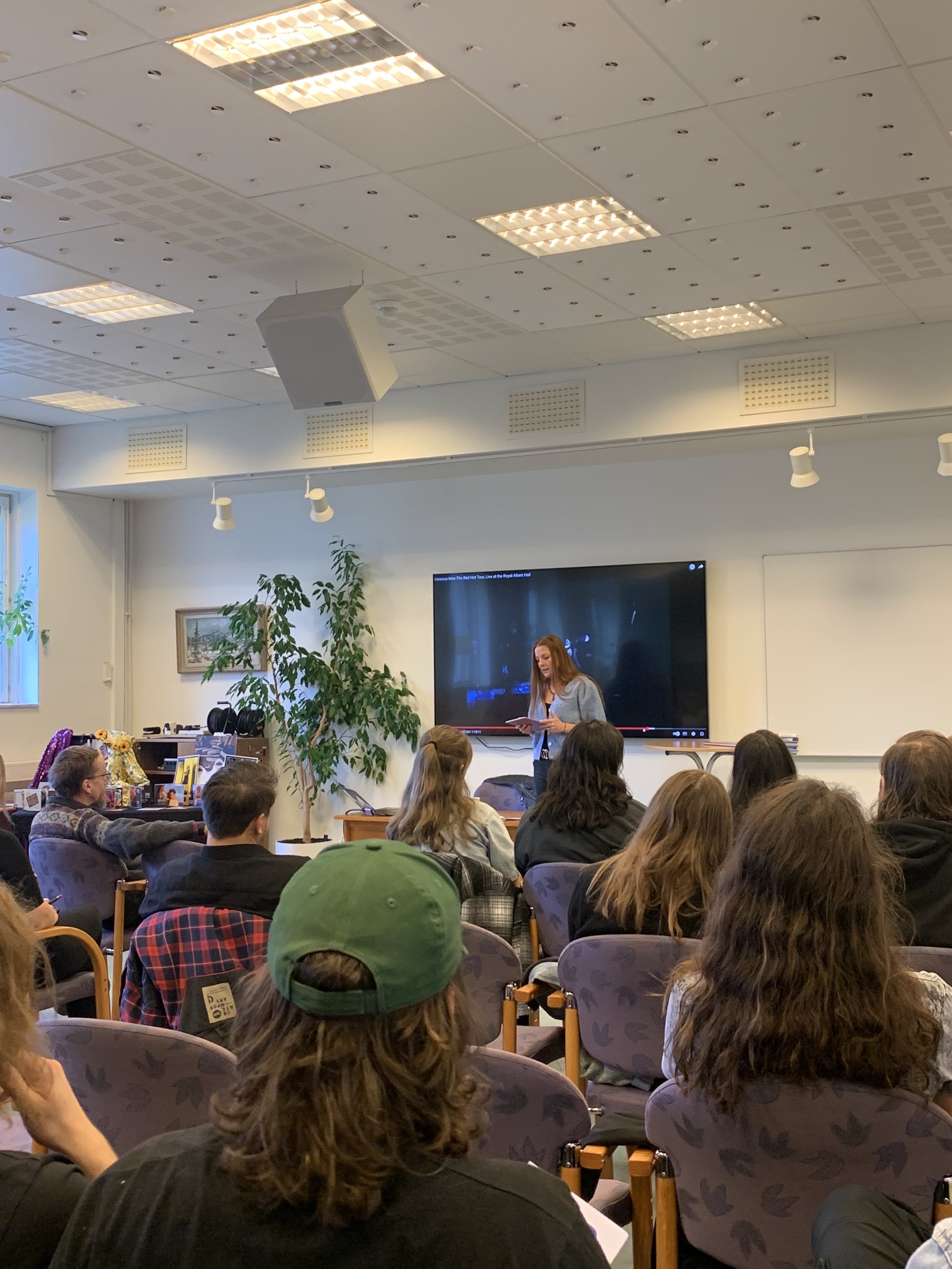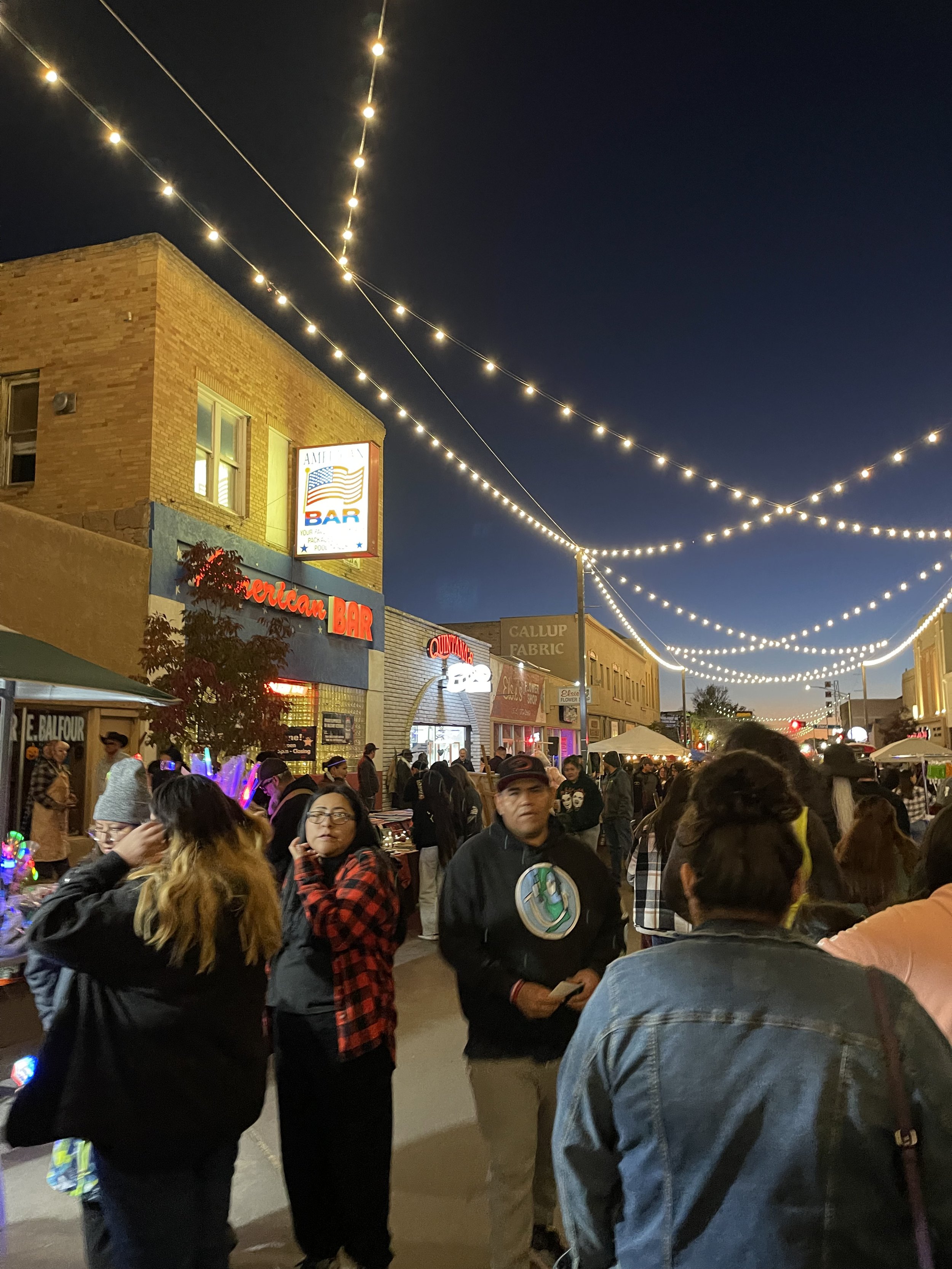Music Policy Resilience Network 2024
Executive Summary
Introduction / Context
The Center for Music Ecosystems is privileged to lead this research project, The Music Policy Resilience Lab, which is supported by the Nordic Culture Fund, the Mimi and Mortimer Levitt Foundation, Highlands and Islands Enterprise, Music Yukon, and Music NL.
This project constitutes Phase 2 of the 2021-22 project, Defining Resilience in Remote Music Ecosystems, which focused on the role and impact of music ecosystem policy, how it can best be deployed in small, mid-sized and geographically isolated communities and how it links to resilience methodologies. Phase 1 centered on the definition of resiliency itself, in which music ecosystems can absorb a variety of internal and external shocks and disturbances, and examined how resilience is embedded in the music ecosystems of three municipalities (Juneau, Alaska; Nuuk, Greenland; and Tórshavn, Faroe Islands), proposing actionable ways to strengthen it.
In Phase 2, the Music Policy Resilience Lab, we extend the project outwards, turning the initial theoretical work into practice through on‑the‑ground research and capacity building with a diverse cross‑section of participating cities across multiple countries. The cities that took part in Phase 2 include:
Bishkek (Kyrgyzstan)
Gallup (New Mexico. USA)
Gander (Newfoundland & Labrador, Canada)
Lerwick, Shetland (UK)
Mariehamn (Åland Islands, Finland)
Nuuk (Greenland)
St. Johnsbury (Vermont, USA)
Torshavn (Faroe Islands)
Umeå (Sweden)
Whitehorse (Yukon Territory, Canada)
Whitesburg (Kentucky, USA)
The objective of this work is twofold.
First, it provides each participating community with specific knowledge and best practices to inform actions—from policy reforms to programming design, advocacy, and more—that will help them strengthen their local music ecosystems and improve their resilience. As detailed below, this work included research to provide each participating community with knowledge and recommendations focused on their local contexts and challenges. The work also produced a variety of ‘global’ recommendations that apply widely to any city or town looking to strengthen its music ecosystem.
Altogether, this research contributes to growing knowledge and capacity around music ecosystem resilience globally and demonstrates the value of making music more integral to how communities think about—and act on—the challenges they face economically, socially and environmentally. It looks at music holistically and emphasizes that by recognising and investing in making one’s music ecosystem resilient—no matter the location—the entire community benefits.
Second, this work represents the first stage of building an ongoing (& resilient!) network of communities that are focused on developing resilient local music ecosystems. This project brings together a cohort of eleven communities, who form the initial seed for what we envision as an ongoing project and network. The idea is to provide a forum wherein individual communities can communicate with each other on best practices for building resilient music ecosystems. This project introduces this network through a series of Labs bringing together participating communities to learn from experts in key thematic areas related to music ecosystems and share knowledge with each other. As we detail below, we plan to further develop this network, including expanding the membership, with a focus on communities from the Global South, and creating infrastructure—like an online forum—to facilitate ongoing communication and sharing of advice, learnings, research, and best practices between communities.
Scope & Methodology
The scope of this project includes:
Working with 11 communities on a 1:1 and group basis to understand the state of their existing music ecosystems and provide research and capacity-building support towards strengthening their resilience.
Creating the Music Policy Resilience Lab comprising five roundtable sessions focused on exploring specific thematic areas around music ecosystem building, sharing knowledge, and supporting the implementation of specific reforms derived from the research.
Publishing a research-informed implementation guide for each of the 11 communities, featuring context‑specific analysis (SWOT; ecosystem mapping), best practice case studies, and guidance to inform the next steps for music ecosystem development.
Catalog the impact of the research and prospective next steps in each community.
This research work has been carried out using multiple methodologies, with a primary focus on the active involvement of the individual city contacts in the process to maximize the impact and value of the work. The research process involved desk research and qualitative interviews, including 1:1 meetings with community representatives and individual research trips to several participating cities to interview local partners and active members of their music ecosystems. It also included specific methodologies related to developing SWOT analyses, as well as arts ecosystem mapping for several of the participating cities. Likewise, individual best practice case studies were compiled based on a combination of qualitative interviews with key stakeholders related to each case and additional desk research.
For each community, the research focused on exploring and providing knowledge and guidance around key areas of need in the context of their existing music ecosystems, defined through conversations with the lead contact for each community. Based on the needs of each community, a plan for research and outputs was developed. The project research outputs demonstrate both the unique context of the participating communities and the similarities and points of connection between participants. Several participants had overlapping key focus areas, including audience development, funding, increasing accessibility, and more. The individual research outputs for each community vary and include compiling best practice case studies around specific thematic areas, undertaking ecosystem SWOT analysis, and mapping.
Labs
Phase 2 featured a series of formal labs, each a two‑hour session exploring a specific thematic area from the perspective of how it might be employed in towns and cities to enhance the resilience of their local music ecosystems. Each lab featured a guest expert who delivered a short presentation and an open workshop with participating MPRL communities.
The five thematic areas covered in the Labs were selected based on findings from Phase 1 of the project and included:
-
Expert(s):
Tiffany Fukuma, Managing Director, Trans Europe Halles
Audrey Guerre, Coordinator, LiveDMA
-
Expert(s):
Maarten Walraven, Head of Operations & Productions at Symphony, co-editor at MUSIC x, zakelijk leider at Stichting Liedhuis
Jacob Clements, UK Project Coordinator, Serenade
-
Expert(s):
Eduardo Saravia, Sound Diplomacy
Suzanne Bull MBE, Founder, Attitude is Everything
-
Expert(s):
Lena Ingwersen, Managing Director, Music Cities Network
-
Expert(s):
Jonathan Bennett, Head of School of Music, Media, and Sound Production, Edinburgh College

Key Findings
The communities participating in Phase 2 are diverse, with needs shaped by their local situations. Accordingly, this research's outputs and key findings reflect the specific contexts—including existing infrastructure, human capital, culture, etc.—and requirements of each community. However, it is also true that many of the needs and challenges around building resilient local music ecosystems are widely relevant, reflecting best practices that may be useful for all communities hoping to take advantage of the power of music to produce value—social, cultural, economic, and environmental.
While there is not enough space in this executive summary to present the full slate of findings (although all the reports are publicly available), below we present the key thematic areas shared across the participants and one finding for each area. We encourage readers to dive into the individual community reports to discover a huge diversity of knowledge, advice and analysis useful for communities engaged in music ecosystem development.
Articulating the social & economic value of music
KEY FINDING: Build a framework that encourages organizations to work collectively
“Connections breed resilience. If everyone is moving together, then when shocks come, they are easier to weather.” Local governments and public funders can ensure that everyone is working together and rowing in the same direction by requiring arts organizations to partner and collaborate with each other (as a condition of funding programs!).
Funding & alternative financing models
KEY FINDING: Funding should aim at promoting multidisciplinarity and creating cultural partnerships
Projects involving different sectors and actors within and outside the cultural realm can unlock funding from other budgets besides the cultural one.
Developing audiences & fostering experimentation
KEY FINDING: Grow slowly and sustainably through public engagement
The best way for music organizations to produce sustainable audience growth is to prioritize patient engagement and properly scaled programming over rapid expansion. Organizations should avoid scaling up programming until they know they have achieved strong community buy‑in.
Programming to achieve greater genre diversity
KEY FINDING: Program genre diversity within event bills
One way to socialize audiences and the local community to less well‑known or popular genres is to program genre diversity within individual event bills. This type of genre‑diverse programming socializes audiences to genres and artists that they might not have otherwise engaged with and also provides seeds for cross‑genre artistic collaborations within the local ecosystem.
Boutique festivals & destination tourism
KEY FINDING: ‘Experience’ is the key.
Consider the festival site itself as a stage. The programming should extend across this entire space—from the music itself to the food, opportunities for community, cross-artistic collaborations, local tourism and unique experiences, and more. At the same time, it’s essential to ensure that music ‘destination tourism’ is developed with sustainability in mind. Festival organizers should work closely with and listen to local communities and experts, to understand their needs and the capacity of the local social and environmental ecology to sustain tourism activities. They should also undertake ongoing sustainability assessments, to track the impact of their activities in real time.
Music import & export
KEY FINDING: Provide artists with planning support
To maximize the outcomes of music import & export programs—for e.g., festival showcase missions (export), or the hosting of local showcase festivals (import)—artists require support to understand and plan for their development needs. Organizers, whether festivals themselves or local music offices, should formally support artists to develop both short- and long‑term strategic plans, and identify the specific goals they are hoping to achieve through export showcasing, and the strategies needed to achieve them. Likewise, they should carefully design import opportunities to maximize the value they bring to the local music community, while providing support to incoming artists to encourage them to make local connections.
Artist development & professionalization
KEY FINDING: Provide holistic support for artists—services AND infrastructure
While communities need to provide specific services and programming to encourage artist development—whether grant support for creation and touring, or mentorship and training, etc.—it is also essential to create the environment around this support within which artists and creatives can flourish. Infrastructure is everything. From cheap practice spaces to recording studios, a thriving venue ecosystem (even if it’s one venue), and more, a music ecosystem that includes both essential services AND infrastructure will enable artists to develop their careers while encouraging them to stick around and not move on to larger cities.
Supporting community health
KEY FINDING: Invest in research and evaluation
Thorough research and evaluation form the foundation for effectively articulating and communicating the benefits of music‑focused community health programs. For these programs to gain acceptance, grow, and, importantly, attract more support and sustainable funding, they need a firm, scientific evidence base that demonstrates their effectiveness.
Increasing accessibility
KEY FINDING: Rely on those with lived experience
Make sure to actively seek out, listen to, and incorporate the perspectives of disabled persons with lived experience when striving to enhance accessibility in music ecosystems. These individuals have a deep understanding of the way that disability impacts interactions with the music industry. Prioritizing the voices and perspectives of disabled individuals with lived experience not only ensures that accessibility measures are responsive but also fosters a sense of ownership and belonging within the music community.
‘This project has been positive and beneficial. Being able to regularly interact with other similar communities around the Northern Hemisphere has allowed us to learn from their experiences and apply to our own project and goals. The Center for Music Ecosystems has been approachable and always friendly, a great partner.’
– Brian Williams, Town of Gander, Newfoundland, Canada
Impact & Next Steps
The research and outputs from this project phase have already proven useful to participating communities. Community representatives have reported using the work as the basis for short- and long term planning, and advocacy activities directed at local governments and stakeholders.
Several communities have also shared progress towards the early stages of developing new policies and programming informed by project outputs, and have indicated that the learnings from the project have helped them to develop a ‘toolkit’ for approaching the challenge of ecosystem building. We will continue to work with the participating communities to promote the work and implement the individual recommendations.
Moving forward, we will lay the groundwork for Phase 3 of the project, which will be named The Music Policy Resilience Network, reflecting the long term objective of creating a shared space for continued research and learning among global communities. As we detail above, in Phase 3, we plan to expand network membership, focusing on increasing global representation and including communities from the Global South. We also plan to further institutionalize the network, through creating shared infrastructure that will facilitate knowledge translation and transfer among the participating communities and beyond. This will include developing a forum for ongoing communication, resource, and best practice sharing among the network.
We look forward to continuing to support and develop the theory, research, and practice around music ecosystem resilience and working closely with the many amazing communities and individuals doing the difficult but rewarding work on the ground to champion music and its value.
‘Thank you thank you thank you! The labs and this report especially has really helped us in our work, providing tools and professionalism to us trying to give a voice to the grassroots culture movement in Umeå. I can’t stress enough how grateful we are for having been given the chance to be a part of this. I hope you feel as well how important your work is. We’re gonna carry all of our new knowledge with us for a long time!’
– Mika Svanbord, Humlan, Umeå, Sweden

Acknowledgements
This report was commissioned by the Nordisk Kulturfond through its Globus Program, the Levitt Foundation and the Highlands and Islands Enterprise.
It was authored by Nuria Ribas Costa, Angharad Cooper, Brodie Conley, Genevieve Allotey‑Pappoe and Shain Shapiro, PhD.
www.centerformusicecosystems.com
Produced in partnership with the following city representatives:
Chingiz Batyrbekov, Kolfest International Arts and Music Festival, Kyrgyzstan
Elin Brimheim Heinesen, independent journalist, editor, singer, songwriter and composer, Tórshavn, Faroe Islands
Michael Bulloch, Gallup MainStreet Arts and Culture District, Gallup, New Mexico, USA
Beth Dart, Music Yukon, Whitehorse, Canada
Jody Fried, Catamount Arts, Vermont, USA
Graeme Howell, Shetland Arts, Shetland, UK
Valerie Horn, Cowan Community Action Group, Inc., Whitesburg, Kentucky, USA
Jonas Lundsgaard Nilsson, Kommuneaqarfik Sermersooq, Greenland
Scott Maynard, Music Yukon, Whitehorse, Canada
Matilda Nordberg, Cultural Producer, City of Mariehamn, Åland Islands, Finland
Bryan Peterson, Shetland Arts, Shetland, UK
Molly Stone, Catamount Arts, Vermont, USA
Mika Svanborg, Kulturföreningen Humlan, Umeå, Sweden
Steve Ruth, City of Whitesburg Levitt Amp Concert Series, Whitesburg, Kentucky, USA
Brian Williams, Town of Gander, Gander, Canada




















